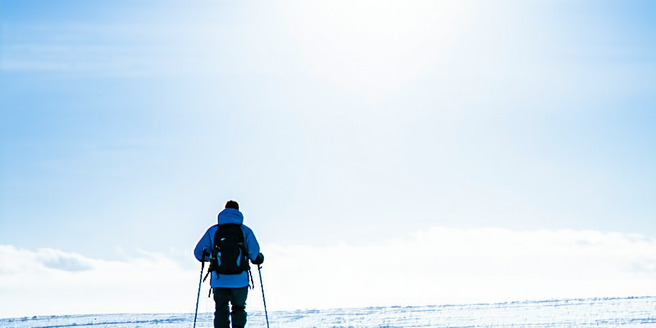
Introduction to Nordic Walking and SAD
Nordic walking is a holistic physical activity that utilizes specially designed poles, enhancing the walking experience. Initially popularized in Finland, it’s gaining traction globally due to its mental and physical benefits. Particularly, Nordic walking shows promise in addressing Seasonal Affective Disorder (SAD), a condition that causes depression during specific seasons, usually winter. The rhythmic nature of the activity, combined with outdoor exposure, provides a therapeutic experience, offering a natural remedy for those affected by limited sunlight and gloom. Through consistent participation, individuals can experience uplifted moods and increased energy levels, combating the lethargy and sadness associated with SAD. Moreover, the communal aspect of Nordic walking encourages social interactions, fostering a supportive network for participants. By understanding its benefits, more people can leverage Nordic walking as a strategic approach to manage and potentially reduce SAD symptoms.
Benefits of Physical Activity for Mental Health
Engaging in regular physical activity is a cornerstone for improved mental health. Activities like Nordic walking significantly reduce symptoms of anxiety, depression, and improve overall mood. Physical exertion triggers the release of endorphins, the ‘feel-good’ hormones, creating a natural high. It also enhances neuroplasticity, promoting better cognitive function and emotional resilience. Furthermore, consistent physical activity helps regulate sleep patterns, which are often disrupted in mental health conditions. By supporting overall brain health, exercise serves as a non-invasive, affordable intervention that complements traditional therapies. Social engagement during group activities also reinforces a sense of belonging and reduces feelings of isolation, common in mental health struggles. Overall, incorporating physical exercise into daily routines provides a robust framework for improved mental and emotional well-being, making it an essential component of holistic mental health management.
How Nordic Walking Helps Alleviate Symptoms of SAD
Nordic walking provides a multifaceted approach to alleviating symptoms of Seasonal Affective Disorder (SAD). The activity promotes sunlight exposure during daylight hours, which is crucial in mitigating the effects of SAD, largely driven by a lack of sunlight. The rhythmic motion of Nordic walking poles engages more muscle groups compared to regular walking, enhancing cardiovascular benefits and increasing endorphin release. This release leads to improved mood and reduced stress levels. Additionally, the structured nature of Nordic walking encourages routine physical activity, which is a critical element in managing SAD. The combination of physical exertion and outdoor engagement creates a synergistic effect that helps stabilize mood fluctuations associated with seasonal changes. Furthermore, Nordic walking can be adapted to various fitness levels, making it accessible and beneficial for a wide range of individuals seeking to manage SAD symptoms naturally.
Scientific Studies on Nordic Walking and Mood Improvement
Scientific research supports the mood-enhancing effects of Nordic walking, making it a viable intervention for improving mental health. Studies have demonstrated that Nordic walking significantly boosts serotonin levels, a neurotransmitter crucial for mood regulation. Research involving participants with depression symptoms showed marked improvement in mood and anxiety after a consistent program of Nordic walking. Notably, a study published in the Journal of Sports Medicine reported that individuals engaging in Nordic walking exhibited lower levels of perceived stress and sadness. This highlights its potential as a therapeutic exercise. Furthermore, Nordic walking’s ability to incorporate outdoor environments adds an additional layer of therapeutic benefits by offering exposure to natural light, essential for regulating circadian rhythms. As more studies emerge, Nordic walking continues to gain traction as an effective alternative or complement to conventional mental health treatments.
Incorporating Nordic Walking into Daily Routine
Incorporating Nordic walking into daily routines can be seamless and rewarding. To begin, invest in a quality set of Nordic walking poles and ensure they are adjusted to the correct height for optimal performance. Start with short, regular sessions, preferably in the morning, to maximize daylight exposure and establish consistency. Consider joining a Nordic walking group to enhance motivation and accountability; the social component adds enjoyment and support. Tailor the intensity to your fitness level, gradually increasing duration and pace as endurance builds. By making Nordic walking a part of your commute, lunch break, or evening routine, you integrate physical activity effortlessly into daily life. The key is to maintain regularity while enjoying the exercise, fostering both physical health and mental resilience. Celebrate small achievements and progress, turning Nordic walking into a sustainable habit that enhances well-being holistically.
Success Stories: Personal Experiences with Nordic Walking
The transformative effects of Nordic walking are evident in numerous personal success stories. Many individuals struggling with SAD and mood disorders have found relief through this unique form of exercise. Take Sarah, for example, a teacher from Oregon, who credits her newfound vitality and mental clarity to regular Nordic walking sessions. Despite long winters, she continues to embrace the activity, stating that it offers a meditative escape and boosts her mood significantly. Another notable story is from Tom, a retired veteran who overcame chronic depression. He shares how the communal aspect of Nordic walking groups reignited his social interactions, and the physical benefits improved his self-esteem. These personal accounts highlight that Nordic walking provides more than just physical health; it fosters emotional well-being and a sense of community, offering a path to recovery for many facing mental health challenges.
